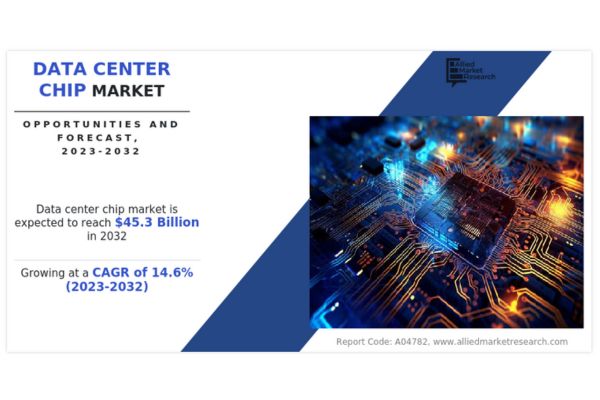A data center chip is a small electronic component designed to manage and process large amounts of statistics in data centers. These chips are important for efficiently running servers, storage systems and network devices. They enable seamless data processing and communication.
In the past few years, the deployment of 5G networks and IoT systems has increased the demand for high-performance data center processors, and this change is expected to accelerate. Moreover, companies such as Qualcomm, AMD, Intel and Nvidia are investing heavily in R&D to develop cutting-edge chip technologies. This is fueling increased demand and innovation for data center chips, which are becoming an essential part of the future technology landscape.
According to a recent report released by Allied Market Research, the global data center chip market revenue is anticipated to reach $45.3 billion by 2032, having witnessed a value of $11.7 billion in 2022, it showcases an outstanding CAGR of 14.6%. These chips are secure, reliable and highly scalable, permitting seamless operational expansion. They also lower costs of administration and enhance energy efficiency, making them an eco-friendly solution. Furthermore, by decreasing IT-related carbon emissions, data center chips support global efforts to combat climate change.
The impact of AI and edge computing on modern chip technology
AI and edge computing is changing the data center chip industry, increasing the need for specialized, high-speed processors. AI tasks, such as training big language models or running recommendation systems, require a lot of computing power. Traditional CPUs, which used to be the key components of data centers, have struggled to handle these tasks. This is where graphics processing units (GPUs) and newer tools like Tensor Processing Units (TPUs) are more effective. For instance, NVIDIA’s GPUs are widely used for AI training, while Google’s TPUs are great for machine learning tasks.
Edge computing, on the other hand, processes data closer to where it was generated, such as IoT devices or autonomous cars. This reduces latency and bandwidth usage. Unlike centralized cloud servers, edge devices depend on compact and powerful chips. For instance, Qualcomm’s Snapdragon chips run AI applications in smartphones, allowing for real-time language translation and facial recognition. Similarly, Intel’s Movidius chip is used in drones and smart cameras to make local AI predictions.
These shifts also promote innovation in chip design. Companies are making chips for specific uses, like AWS’s Graviton processors, optimized for cloud efficiency, and Tesla’s Dojo chips, which are made for autonomous vehicle AI. The move from general-purpose chips to specialized solutions shows the growing diversity of data processing needs. Therefore, AI and edge computing are influencing the chip industry to develop stronger processors. These advancements help save energy and are designed for specific tasks, resulting in improvements in fields like healthcare, robotics, and smart cities.
Investments and innovation fostering industry growth
The data center chip sector is highly competitive with global tech giants vying for dominance. Many companies are launching groundbreaking products to cater to the changing demands of the developing market. For example, in January 2023, Huawei Technologies Co. Ltd. introduced the first-ever 50G POL prototype designed for next-generation Wi-Fi 7 campus networks. This technology upgrades campus networks from 10G PON to 50G PON and offers faster and more reliable Internet. It also allows customers to customize their networks and seamlessly upgrade networks to 50G PON in the future, protecting initial network construction investments.
Furthermore, in March 2024, ORCA Computing, Sparrow Quantum, Pixel Photonics, and the Niels Bohr Institute (NBI) announced their collaboration at the Eurostars project ‘SupremeQ.’ This significant initiative brings together quantum professionals from Germany, the UK, and Denmark to accelerate the commercialization and development of photonic quantum computing technologies with the goal of achieving quantum advantage.
In summary, the growth of the data center chip industry is attributed to the rise in demand for high-performance processors for AI and edge computing. Furthermore, the growing shift creates numerous profitable prospects for innovation as well as expansion since specialized chips have become essential components of effective data processing, cost and energy savings for a wide range of industries.














